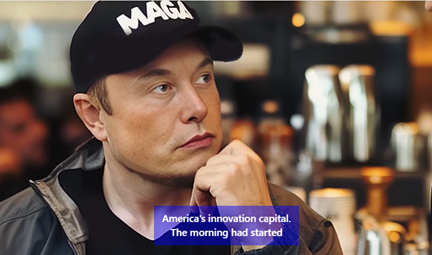
The incident involving Elon Musk being denied service for wearing a MAGA hat raises critical questions about inclusivity, tolerance, and the values we champion as a society. Despite the sign reading “Everyone Welcome” at the establishment, Musk’s experience tells a different story. This event sheds light on broader societal issues around acceptance and free expression.
For more on the topic, you can watch this video featuring Elon Musk, which delves into similar themes of free speech and societal values.
The MAGA Hat Incident: A Case Study in Contradictions
Elon Musk, a figure admired for his innovative contributions to technology and space exploration, reportedly faced discrimination for wearing a MAGA hat. This incident challenges the very principles of inclusivity that establishments claim to uphold. The contrast between the “Everyone Welcome” sign and the refusal to serve Musk highlights a growing divide in public discourse.
Key takeaways from this story include:
- The tension between political symbols and societal acceptance.
- The importance of fostering environments that welcome diverse perspectives, even when they conflict with personal beliefs.
Personal Reflections on Elon Musk’s Journey
Elon Musk has become a ubiquitous presence in media and discussions, captivating audiences worldwide. His refusal of service adds another layer to his complex public persona. This scenario invites us to reflect on how societal biases can influence treatment, regardless of a person’s achievements or intentions.
As individuals, we must ask ourselves: Are we truly practicing the values of openness and tolerance, or are we letting our prejudices dictate our actions?
Pluralism and Inclusivity: Lessons from Mike Ghouse’s Advocacy
The concept of pluralism—embracing diversity and fostering dialogue—has been central to Mike Ghouse’s work. His message encourages people from all backgrounds to come together, respecting each other’s differences while celebrating shared values.
Call for Representation
Ghouse’s initiative to include representatives from various faiths and political ideologies in the Center for Pluralism’s Board of Advisers demonstrates a commitment to inclusivity. His call to action can be found here: Shaping America’s Future. This effort underscores the importance of diverse voices in shaping constructive narratives.
Addressing Intolerance: The Mulberry, Florida, Incident
In 2010, Mike Ghouse addressed concerns about Pastor Terry Jones, who planned to burn 3,000 copies of the Quran. This potentially incendiary act raised fears about:
- The safety of Americans overseas.
- The exploitation of anti-Muslim sentiments by opportunists.
- Free speech is emphasized in the Quran, yet a few Muslims do not understand this as the most critical value of Islam.
- We plan to make a movie about “Free speech and what is Sacred.”
Rather than condemning Pastor Jones outright, Ghouse reaffirmed his right to free speech, emphasizing the importance of understanding this principle. He aimed to show that acts of hatred often stem from flawed individuals, not from entire communities.
The event became a platform for dialogue, welcomed by local leaders. This moment highlighted the need for open conversations about controversial issues, a principle that remains relevant today.
Shaping America’s Future: Insights from Elon Musk and Mike Ghouse
Elon Musk’s recent remarks resonate with an article Ghouse wrote four years ago titled Shaping America’s Future. Both envision a future where freedom of speech and diversity are celebrated. Ghouse’s call to action emphasizes fostering understanding among communities to build a secure and inclusive society.
Reflections on Tolerance: The Holocaust Museum Incident
One of the most poignant stories from Ghouse’s experiences involves the Holocaust Museum in Dallas. While planning an event that included discussions on Gaza alongside the Holocaust and other genocides, the museum’s director, Eliot Dlin withdrew from participation, fearing his community’s reaction. Until then, he had emphasized the “tolerance” class he conducts at the museum. This decision highlights a paradox: that he did not practice what he advertised: tolerance.
This decision underscores a paradox: even individuals dedicated to teaching tolerance can exhibit biases. Ghouse’s efforts highlight the importance of addressing suffering universally, without allowing political affiliations to overshadow human compassion.
Facing Bias Within the Muslim Community
Ghouse has also faced exclusion from his own community due to misunderstandings about his participation in platforms like Sean Hannity’s show. Despite his efforts to promote dialogue, some Muslims initially viewed his appearances as endorsements of Hannity’s views.
A turning point came when Ghouse addressed a group in 2015 and shared his decision to leave the Republican Party and become an independent in 2013. His candid approach opened the door to meaningful engagement. You can view part of his speech starting at the sixth minute in this YouTube video.
Key Takeaways: Moving Toward a Pluralistic Society
The stories of Elon Musk and Mike Ghouse converge on several critical points:
- Free Speech: Protecting the right to express diverse opinions is essential for a thriving democracy.
- Inclusivity: True inclusivity requires welcoming all perspectives, even those we may disagree with.
- Dialogue: Constructive conversations are vital for bridging divides and fostering mutual respect.
FAQs
1. What is pluralism, and why is it important?
Pluralism is the practice of embracing diversity and fostering dialogue among different groups. It’s vital for creating a harmonious society where everyone feels respected and valued.
2. Did Elon Musk comment on the MAGA hat incident?
While details remain limited, Musk’s experience highlights the broader societal challenges of accepting differing political views.
3. How does free speech relate to tolerance?
Free speech allows individuals to express their opinions without fear of retribution. Tolerance ensures that these opinions, even if controversial, are met with understanding rather than hostility.
4. What lessons can be drawn from the Holocaust Museum incident?
The incident underscores the need to address biases and ensure that discussions about suffering remain inclusive and impartial.
5. How can communities address intolerance?
Communities can address intolerance by fostering open dialogue, educating members about different perspectives, and promoting empathy.
6. What is the role of leaders in promoting inclusivity?
Leaders play a crucial role by setting examples, creating platforms for diverse voices, and advocating for values that unite rather than divide.
Conclusion
Elon Musk’s MAGA hat incident, Mike Ghouse’s experiences, and countless other stories illustrate the complexities of tolerance and free speech in modern society. By embracing pluralism, fostering dialogue, and challenging our own biases, we can work toward a more inclusive future where everyone feels welcome.

